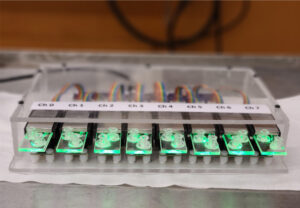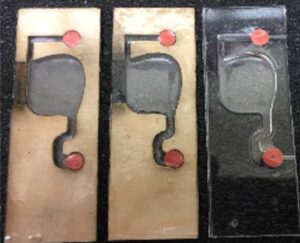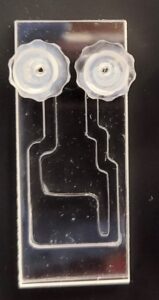Contamination detection often requires lengthy culturing steps to detect low-level bioburden. To increase the rate of detection and decrease the limit of detection (LOD), a system featuring microfluidics and a multichannel fluorometer has been developed. The eight-channel fluorometer enables parallel testing of multiple samples with the LOD as low as <1 cfu/mL with incubation and filtration. This low-cost system utilizes the slope of fluorescence intensity that serves as the criterion for bioburden detection. The redox indicator dye resazurin is used to monitor the presence of viable cells in this study and is reduced to resorufin with a high quantum yield at 585 nm. The sample under investigation is spiked with resazurin and loaded in a special-design microfluidic cassette, and the rate of change is observed via the fluorometer. The method was validated using primary Escherichia coli culture in comparison with a spectrophotometer which served as the gold standard. The assay is shown to pick up inadvertent contamination from test tubes, pipette tips and different surfaces showing its applicability in real-world settings. Currently, we are working on the bioburden testing in clean drinking water and machine learning on the sensor data to automate bioburden classification. Considering its portability, low cost, simplicity of operation, and relevant assay sensitivity, the system is well positioned to detect low-level bioburden in the laboratory, pharmaceutical, and field settings.
Related Publications:
Wood Microfluidics
Abhay Andar, Md-Sadique Hasan, Venkatesh Srinivasan…
Analytical Chemistry 2019 91 (17), 11004-11012. DOI: 10.1021/acs.analchem.9b01232
Rapid Ultrasensitive and High-Throughput Bioburden Detection: Microfluidics and Instrumentation
Md Sadique Hasan, Monireh Marsafari, Michael Tolosa… Analytical Chemistry 2022 94 (24), 8683-8692. DOI: 10.1021/acs.analchem.2c00980
Microwave induced thermally assisted solvent-based bonding of biodegradable thermoplastics: an eco-friendly rapid approach for fabrication of microfluidic devices and analyte detection. Hasan, M.S., Borhani, S., Ramamurthy, S.S… Sci Rep 12, 16075 (2022). https://doi.org/10.1038/s41598-022-20257-w


